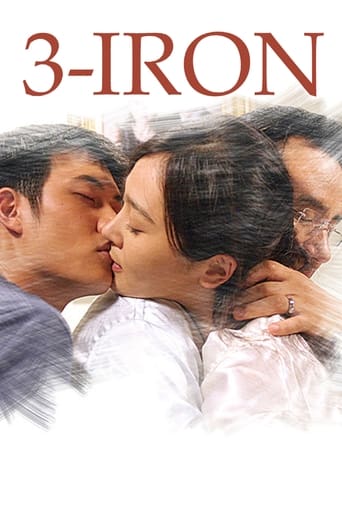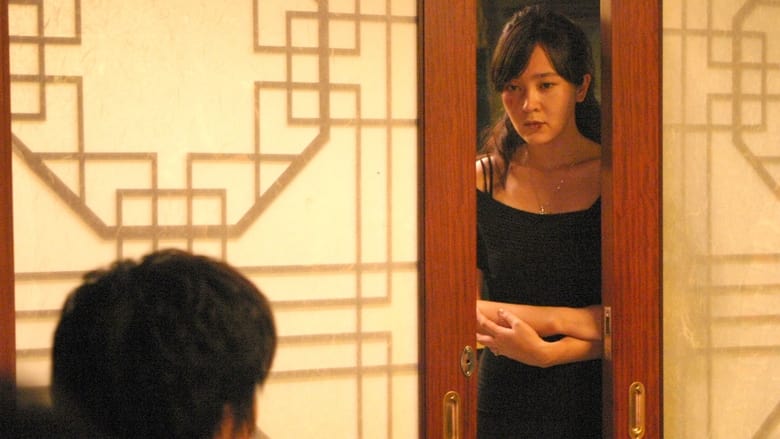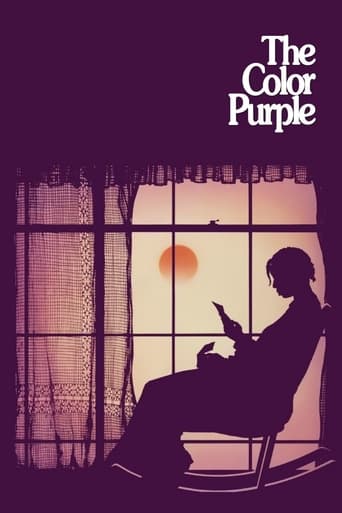3-Iron (2004)

A young man, whose only possession is a motorcycle, spends his time riding around the city looking for empty apartments. After finding one, he hangs out for a while, fixing himself something to eat, washing laundry or making small repairs in return. He always tries to leave before the owners get back but in one ostensibly empty mansion he meets the abused wife of a rich man and she escapes with him.
Watch Trailer
Cast


Similar titles
Reviews
Tae-suk tapes fake fliers inside apartment buildings and along city blocks. Several hours pass and the house or apartment that leaves the flier untouched, he breaks into them. One day by accident, he breaks into a house with a battered wife, Sun-hwa, inside. Basically, a romance ensues between these two quiet soulmates.Melancholy and disturbing, this film transcends into a simple, dream-like romance full of atmosphere and beauty. It's difficult to explain why this film is beautiful; for me, the characters transcend their despair and find an improbable solution to loving each other. Minimalistic and mysterious, the director Kim Ki-Duk creates a film that leaves profound questions up to the viewer.Mostly, this film uses minimal dialogue which feels slightly stilted and gimmicky. Although the lack of dialogue is a gimmick, "3-Iron" is a profoundly rewarding experience.
3-Iron (빈집, Bin-jip, meaning Empty House) is a 2004 Korean film directed by Kim Ki-duk, a South Korean filmmaker noted for his idiosyncratic "art-house" cinematic works. The plot revolves around the relationship between a young drifter and an abused housewife. The film is notable for the lack of dialogue between its two main characters. Film review aggregator Rotten Tomatoes reported that 86% of reviewers (75 out of 87) gave the film positive ratings with an average score of 7.4. The film grossed $241,914 in North America and $2,965,315 worldwide. A haunting love tale full of poeticism and beauty. A film that transcends fantasy and reality, instead offering an uncanny blur between the two. 3-Iron is a film dripping with love, longing and anguish. A fantastic romantic fable from Kim Ki-Duk.
3-iron is the name of a golf club, which in this case applies to a main component of story here. A young man on a motorcycle rides around and leaves a notice on various doorknobs, and then returns later to find out who is not at home. He picks the locks and takes up residence; cooking, cleaning clothes, bathing, and just making himself at home. At one home, he meets an abused young woman living in a bad marriage. They ride off together; Bonnie and Clyde like, and make home wherever they may land. The woman never speaks, and neither does the man. They are both excellent; relying on facial expressions and body movement to portray emotion. The ending is rather abrupt, but at least 3-Iron will keep you guessing, and its dream like quality is a good enough reason to recommend this unusual film.
With a modest $1-million budget, this 2004 Korean film takes you on a journey through the life of a young man, Tae-suk (Jae Hee), who spends his every waking moment living someone else's life. He is a wanderer, who doesn't appear to have any family, except for the families he photographs when breaking and entering their homes while they're vacationing, vicariously enjoying their amenities. The opening scene pictures the swinging of a 3-iron golf club in a green, grassy panorama and transitions with a simple cut to a scene with a man honking the horn of his car. Of course, most would honk the car's horn if Tae-suk blocked in their car with his motorbike. He left it there while he was taping "take-out" signs to the doors of houses nearby. He doesn't work for a restaurant, however. Soon enough, the viewer realizes he does so to find out if families are away on vacation to ensure he can take a vacation himself in their houses until they return. Of course, not without washing every bit of dirty laundry in the house and leaving a few tricks for the returning voyager. While the viewer is left wondering what exactly is going on, there is a sense of subterfuge that will keep you watching until the end. Tae-suk's daily expeditions of moving from house to house to enjoy the lives of the homeowners in a voyeuristic way will make you wonder why you are watching this and what the point of the film actually is. Keep watching because the plot gets tangled as Tae-suk stumbles into a house that wasn't as empty as he assumed. Tae-suk breaks into a house where he meets Sun-hwa. Although their interactions remain silent, it is clear there is some sort of meeting of the souls when Tae-Suk returns to the house to check on Sun-hwa after he realizes she needs help. Seeing the wounds left from her abusive husband, Tae-suk treats her with the utmost privacy and respect, ironically, by breaking back into her home and leaving fresh clothes for her upon her emergence from the bath. The deliberate twists and turns of the plot offer an insight into the main character's innermost feelings and experiences in life, though seemingly unrealistic at times. Tae-suk and Sun-hwa run off together when her husband returns home, after much trial and tribulation between the encounter of these two men. But wait, this isn't a Disney film. This film doesn't have a fairy tale ending. Retaining the memories of their time together, Tae-suk uses his ever-present digital camera to impose himself and Sun-hwa, who follows him as he trespasses, into the lives of the vacationing homeowners. Although silent and seemingly aloof, her true love is apparent in every interaction Sun-hwa has with her soul mate, Tae-suk.The short screen cuts and melodic interludes embellish the partial periods of time that Tae-suk remains in the random, temporarily vacant homes. Like many of director Kim Ki-duk's films, the main character is mute and peripheral ones are laconic. If you are a fan of American films, where the hero does most of the talking, this one is most definitely not for you. Despite the hero's lack of conversation, the Moroccan music playing through the scenes help to move the film along at a steady pace. The melody also invites the viewer to enter a mysterious world and engage in the voyeuristic frame-within-a-frame perspective that writer, director and producer Kim Ki-duk creates. Similar to Ki-duk's Samaritan Girl, written and produced in the same year, there is a deep underlying sense of unhappiness and passionlessness in the love lives of the main female characters. They find their soul mates but are forced to part just before another life-changing event occurs. The comparison of 3-Iron to American films is minimal in terms of screenplay, director cuts, and cultural similarities. There are intricate details that really piece the movie together if a viewer watches from a culture-less, judgment-free perspective. If you attempt to impose American film culture on this masterpiece, you will miss some obvious connections that the more observant, objective viewer is bound to catch. While the American viewer might notice such subtleties as the man leaving the driveway in the very beginning of the film is none other than Sun-hwa's husband, the cultural values and norms of this film may lead to incorrect conclusions. As Sun-hwa remains alone during the days in which her husband is away on work trips, one might assume that he forced her to remain there almost like a slave that does not work. When the police bring her back to him, from the American perspective, it would appear that they conspire to enslave this young woman. Yet, in Korea, the woman is expected to be submissive to her husband, unlike in the United States. Although this perspective is becoming outdated, the culture is slow to move past this, especially for very conservative, business-centered individuals. From an American perspective, submission to a husband may seem wrong, but to the Korean viewer it is a cultural norm. The morality of the issue is bound to come up, but difference in norms could confuse the American viewer. Nevertheless, the film is enjoyable, despite the temporary confusion one may experience in certain scenes. I highly recommend this film to any cinéphile. If you enjoy dramatic flavor, imagine the romanticized tragedy of the American film, Remember Me, paired with the silence, yet flourishing meaning like The Artist, and a refreshing nihilistic edge, and you've pictured this must-see, award winning film.
















